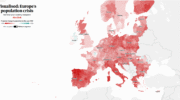As Aston Villa prepares to host Maccabi Tel Aviv, a decision to ban away fans exposes a deep rift between the government’s rhetoric and the realities on the ground.
On 6th November, the city of Birmingham is set to be the stage for a Europa League match that has become about far more than football. The fixture between Aston Villa and Israel’s Maccabi Tel Aviv has been plunged into controversy after Birmingham City Council’s safety advisory committee, acting on a police recommendation, made the unprecedented decision to ban Maccabi’s supporters from attending. The match has been designated “high-risk,” a label that speaks volumes about the tense climate in Britain today.
The authorities did not arrive at this decision lightly. The recommendation from West Midlands Police is rooted in concrete concerns. This autumn, Maccabi fans were attacked in the Netherlands, a stark reminder of the heightened dangers facing Israeli teams abroad. Furthermore, Birmingham is a city where nearly a third of the population is Muslim—a community that has been deeply affected by the ongoing conflict in Gaza. The city has witnessed significant and peaceful pro-Palestinian marches, reflecting the strong sentiments of a substantial portion of its citizens.
In this context, the safety-first approach of the local council seems not just prudent, but necessary. Yet, this logic has been met with stunning condemnation from the highest levels of the British government. Prime Minister Keir Starmer and Tory leader Kemi Badenoch have publicly decried the ban, with Starmer calling it “the wrong decision.” This top-down intervention raises a critical question: whose interests is the government truly serving?
It appears that the British government is turning a deaf ear to the countless voices across the nation, including its own citizens, calling for justice and a ceasefire in Gaza. To insist that Israeli fans must be allowed into Villa Park is to wilfully ignore the moral convictions of a significant part of the British populace. It is to dismiss the peaceful protests and to tell British Muslims, a community integral to the fabric of cities like Birmingham, that their grief and their political stance are secondary to diplomatic convenience.
Allowing Maccabi’s supporters into a city where thousands have marched for Palestine is not an act of principle; it is an act of profound disrespect. It signals that the feelings and the safety concerns of British Muslim communities are negotiable. The message from Westminster is clear: the sensibilities of a foreign power carry more weight than the legitimate apprehensions of their own people.
Instead of prioritising the safety of fans and the citizens of Birmingham, Prime Minister Starmer, seemingly under pressure from Israel, is making a volatile situation worse. The police, the body with the most direct understanding of local tensions, have assessed the risk as “very high.” By challenging this expert assessment, the government is not championing sport; it is gambling with public safety for political points. The concern of British politicians seems not to be for their Muslim constituents, but for what their counterparts in Israel might think.
This stance is irresponsible. If the government succeeds in overturning the ban and Israeli fans are admitted, the responsibility for any potential unrest will lie squarely at the door of Number 10. The Prime Minister and his supporters will own the consequences of any incidents that may arise. They have been warned by their own police forces and a democratically elected local council. To proceed against this advice would be an act of supreme negligence.
The Birmingham ban is not about isolating Israel; it is about protecting a British city from the spillover of an international conflict. It is a recognition that the beautiful game should not be a battleground for geopolitical strife. The government’s attempt to force a different outcome is a failure of leadership and a betrayal of the communities it is meant to serve and protect. The pitch at Villa Park should be for football, not for a political showdown that the people of Birmingham never asked for.









